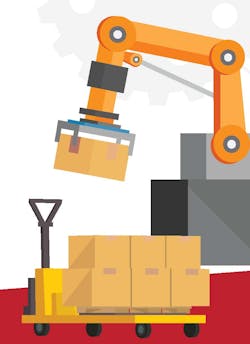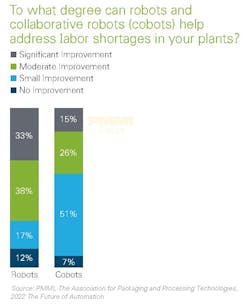Manufacturers Consider Automation to Address Workforce Shortages
Both consumer packaged goods companies and OEMs are struggling to recruit and retain workers, according to PMMI Business Intelligence’s 2022 report “Challenges and Opportunities for Packaging and Processing Operations.”
PMMI asked attendees at October’s PACK EXPO International to participate in a pre-show survey on current workforce hurdles and the technologies and strategies that might help overcome them.
The responses highlighted the challenge of finding workers with particular skill sets, as these companies search for skilled machine operators, technicians and those familiar with complex equipment or digital automation technologies.
One CPG noted a “lack of candidates who possess the skill to run complex packaging equipment,” adding that the company struggles “to achieve strict production targets and KPIs.”
Recent research published by The Manufacturing Institute showed that 93% of respondents were struggling to find skilled applicants for vacancies within their companies. Carolyn Lee, Manufacturing Institute president, stated “we’re averaging more than 800,000 open jobs in manufacturing a month.”
Workforce Retention Also Difficult
In addition to skills shortages and the availability of enough workers to cover production schedules, many survey respondents stated that retention of talent was a problem.
This high turnover of staff often led to training gaps among new hires, including familiarity with the latest technology and technical skills.
“We find it challenging to recruit the next generation of talent into the industry,” one respondent from an OEM explained. “Our businesses are complicated, requiring critical thinking and often technical aptitude.”
Technology and Automation - Delivering Solutions to Workforce Challenges
Respondents said technology could reduce costs and demand for workers by automating manual tasks and processes, but that benefits would not end there.
They also noted that technology can assist with retention by automating repetitive tasks, making work more exciting, increasing the span of control of current operators, and accommodating lower skilled workers.
“Automation of repetitive motion tasks reduces the dependency on labor, improves safety and improves worker retention,” one company said.
By using automation and available technologies to speed up processes and throughput, deliver greater efficiencies and reduce headcount, companies also see the potential for cutting costs, simplifying their existing operations and improving safety.
Furthermore, technology is also perceived to be a solution to the training challenges many participants faced. New training and guidance tools such as augmented reality could offer a solution to better training and engagement, and faster access to get new hires the skills they need.
Collaborative Robots in the Mix
Over 70% of CPGs think that robots could have a moderate or significant impact on addressing labor shortages in their plant.Conversely, over 50% of CPGs think that cobots could only have a small benefit or no benefit to addressing labor shortages.
More respondents (12%) said robots would have no benefit compared to those who think cobots would have no benefit (7%).
Robots are often seen as harder or more complex to implement in a plant than cobots, which might be an explanation for this. Some CPGs noted that cobots are slower than manual processing though.
What Do Companies Want from Packaging Technologies?
When it comes to packaging technologies, businesses are in the market for solutions that are simple, easy to use and “user friendly” (a term that came up repeatedly), accommodate lower skilled workers, and are flexible/versatile, reliable and easy to maintain.
One supplier respondent said it wanted solutions that are “user friendly to today’s workforce – especially younger people. Intuitive. Easy to get help/support from the supplier/OEM.”
Other priorities for packaging technologies include cost savings, scalability, ergonomics, standardization with existing systems, the ability to reduce workforce, easy set up and training, interconnectivity and good support packages.
How are Companies Addressing Workforce Challenges?
43% of companies said the ability to provide remote diagnostics, allowing operators to solve their own problems, would help solve workforce challenges.
42% of companies are increasing ease of use with intuitive equipment.
42% are developing young talent by utilizing internships, working with education organizations (e.g. The Institute of Packaging Professionals), increasing exposure to the industry.
28% said positions must be thought of as purpose-driven, where employees are engaged and part of solving problems.
20% said workforce challenges could be overcome with machinery that tells operators how to run them.
It seems clear that automation technologies will play an increasing role in the future of the packaging industry. Automation has proven to be a key focus of companies looking at ways to cut costs, improve productivity and reduce their dependence on personnel as skill and retention problems continue to affect them.
Source: PMMI Business Intelligence, 2022 Challenges and Opportunities for Packaging and Processing Operations.
Download the FREE report below.



